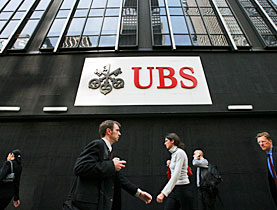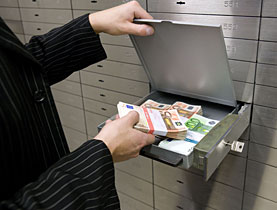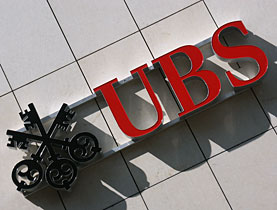US wins court order for UBS bank records

A Miami judge has authorised United States officials to seek information from Switzerland's largest bank, UBS, on taxpayers suspected of evading income taxes.
The order gives the US Internal Revenue Service permission to serve a summons on UBS to obtain information on possible fraud by people whose identities are unknown.
Some observers see the decision as putting further pressure on Switzerland’s traditional banking secrecy laws.
US district judge Joan Lenard granted the so-called “John Doe” summons a day after the justice department made what it called an unprecedented request for the records, part of an IRS investigation into services provided to US clients from 2000 to 2007.
Also on Tuesday UBS announced that four board members were stepping down later this year, in the wake of huge losses as a result of the US subprime mortgage crisis.
The UBS share price closed 5.3 per cent down at SFr20.3 ($19.94). But at the close of trading on Wednesday it had recovered to SFr20.62, up by 1.58 per cent.
Under pressure
UBS is also under pressure to overhaul its business after reporting more than $37 billion in writedowns during the global credit turmoil.
The summons will allow the IRS to obtain information about US taxpayers who have UBS bank accounts but did not file forms detailing their taxable income.
“The order clears the way for the IRS to take the next step against wealthy clients who don’t pay their taxes,” commented IRS Commissioner Doug Shulman in a statement.
“People with hidden foreign accounts can no longer rest easy.”
“Working diligently”
The bank said it was taking the matter “very seriously” and was “working diligently with both Swiss and US government authorities, consistent with Swiss law and the legal frameworks for intergovernmental cooperation and assistance”.
No demand for administrative cooperation has yet been made by US authorities but if one were to be approved by the Swiss authorities, they would then ask UBS for the data of the clients concerned.
The issue will then be if there has been tax evasion or tax fraud. Switzerland does not regard tax evasion as a criminal offence, an issue that has repeatedly been criticised by the European Union and others.
While a Swiss parliamentary commission is preoccupied with the consequences of the case for Switzerland as a financial centre, the Swiss Bankers Association (SBA)and the finance ministry have taken a more relaxed stance.
“According to the information we have at the moment, it is not an issue that affects banking secrecy,” commented Thomas Sutter from the SBA in Basel. He noted that the case was specific to UBS.
Conspiring to defraud
A former UBS banker, Bradley Birkenfeld, pleaded guilty in Florida last month to conspiring to defraud the IRS by assisting UBS clients in avoiding US reporting requirements on income in Swiss bank accounts.
According to Bireknfeld’s court statement, UBS employees helped wealthy US clients to conceal their ownership of assets held offshore by creating bogus entities and then filing IRS forms falsely claiming the entities owned the accounts.
On one occasion, Birkenfeld helped a client by purchasing diamonds with the client’s Swiss bank account funds and then smuggling them into the US inside a toothpaste tube, according to a grand jury indictment.
Birkenfeld said in court that UBS had about $20 billion of assets under management in “undeclared” accounts for US taxpayers.
swissinfo with agencies
UBS endured a tough 2007 and has spent the first half of 2008 in no better shape as a result of the United States subprime mortgage crisis.
In October 2007, UBS said it would cut 1,500 jobs in its investment banking arm, including that of its head Huw Jenkins. UBS chief financial officer, Clive Standish, left at the same time.
Later that month the bank announced it was writing off SFr4.2 billion on subprime losses and SFr726 million pre-tax loss for the third quarter – the first quarterly loss in nine years.
In December UBS said another $10 billion would be written off as the US subprime crisis deepened. It also announced plans for a SFr13 billion funding plan from Singapore and Middle East investors.
A further $4 billion was written off in January, bringing the total losses to around SFr20 billion. Another SFr19 billion was written off in April, accompanied by the news of Marcel Ospel’s resignation as chairman. The bank sought to raise another SFr15 billion through a rights issue.
In May, the bank announced a further 5,500 job cuts as it posted first quarter losses of SFr11.5 billion.
Such a summons is made when the name of the taxpayer under investigation is unknown and therefore not specifically identified.
It can only be served after approval by a US federal court.
The IRS says the purpose of a John Doe summons must be to investigate the tax liability of a specific unidentified taxpayer or group of taxpayers, even if a secondary purpose is to gather information for research purposes.

In compliance with the JTI standards
More: SWI swissinfo.ch certified by the Journalism Trust Initiative



You can find an overview of ongoing debates with our journalists here. Please join us!
If you want to start a conversation about a topic raised in this article or want to report factual errors, email us at english@swissinfo.ch.